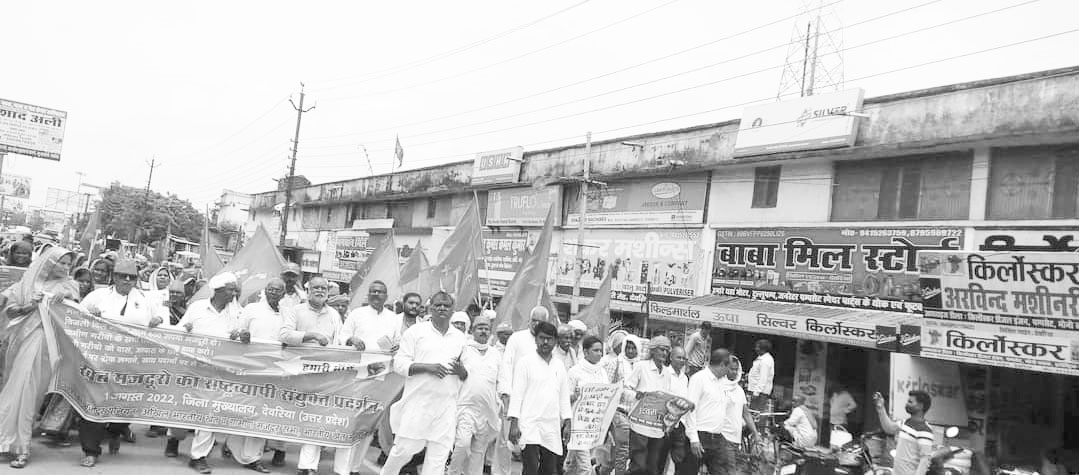
Vikram Singh
THE all India protest day on August 1, was organised successfully throughout the country. On the call of five organisations of agricultural workers, protest actions were organised in hundreds of districts and memoranda were sent to the President of India. Agricultural and rural workers participated in these protest actions in huge numbers. The joint charter of demands with 28 points was the base of the call, but the main slogan was employment, land, housing, education, health, and equality for all.
The call for the all India protest day was given by the all India joint convention of agricultural workers, which was held at HKS Surjeet Bhawan, New Delhi, on May 16th, 2022. AIAWU has been working to unite agricultural workers on their issues for some time now. We have organised various lower-level struggles on the issues of MNREGA, PDS and social atrocities.
Earlier, an all-India joint convention against caste atrocities was also organised. A charter of demands which included a wide range of issues of agricultural workers was adopted in the convention, which is supposed to be the base of the united struggles. A massive and rigorous campaign was organised on the demand charter through the street corner public meetings in villages. Leaflets were distributed by the states in their respective languages.
ISSUES OF THE AGRICULTURAL WORKERS
The rural proletariat is reeling under the high rate of unemployment and price rise. The rural unemployment ratio has reached historical levels. The work for agricultural workers in agriculture has already been reduced to a minimum. In these conditions, MGNREGA can be a big saviour for rural people, which has a provision to provide 100 days for work at prescribed wage rates. But the central government has never allocated the sufficient budget required for its implementation.
On top of this, the price rise is affecting the poor the most. The high cost of education and medical services is making the lives of agricultural workers miserable. Instead of addressing these issues, the government is coming up with proposals for MGNREGA, which discourages people from joining work. Decisions like attendance through the national mobile monitoring system app (with provisions of taking real-time attendance of workers at NREGA worksites along with geo-tagged photographs of workers twice a day, one before 11 am and the second after 2 pm) and controversial advisory which has divided the allocation of funds, work, and payment of wages based on caste despite its adverse experience in almost all the states and finally the notification issued on July 18th which direct states not to allow more than 20 works in panchayat has created further complications.
Under these conditions of low income and massive unemployment, the lives of agricultural workers majorly depend on welfare schemes and public sector institutions. Currently, the social welfare State is weakening with the conscious implementation of anti-people and pro-corporate policies of the central and most state governments. Except for the Kerala Government, the public sector, including health and education, is being heavily privatised. Health and education are being privatised rampantly, making them inaccessible for the common people. The pensions provided by the states (old age and widow) are a big help for agricultural workers when their body does not allow hard work. The amounts paid under these pension schemes are very meagre but still provide significant support to them. But recently, it is becoming more challenging to avail of these pensions as the targeted number of the beneficiaries is fixed by the states.
THOUSANDS PARTICIPATED IN PROTESTS
These are conditions which forced agricultural workers to take a path of struggle to ensure the survival of their families. Almost all states witnessed good mobilisations on August 1. In West Bengal, scores of agricultural workers joined the protests in all districts. In West Bengal, NREGA workers have not received wages for almost one year now. The TMC government is entirely corrupt, and similar practices are there in the implementation of NREGA. There are reports of enormous corruption. Using this, the central government has stopped MNREGA funds for the state. Almost Rs 2620.87 crore of wages of MNREGA workers from West Bengal is pending with the central government.
All the districts of Kerala organised massive district-level protests attended by workers in good numbers. The main programme was at Trivandrum, which was addressed by the state secretary of KSKTU, the state unit of AIAWU. The Tripura state government denied permission to hold protests on August 1. Still, the union organised programmes in all districts. The state programme was organised at Agartala. All India general secretary of AIAWU, B Venkat addressed the programme and called upon the workers to launch an issue-based struggle against the anti-people policies of the state and central governments.
Good programmes were organised in almost all districts of the southern Indian states. Protest actions were held in all the rural districts of Telangana and Andhra Pradesh. In these two states, the land issue was focused along on the common charter of demands. Tamil Nadu and Karnataka also witnessed good protest demonstrations. In the Mandya district of Karnataka, a militant protest was held, where police lathi-charged the protesters.
The protest day was also well received, and actions were organised in the Hindi-speaking states. Three organisations of agricultural workers have decided to organise taluka-level protests in Bihar. Accordingly, taluka level mobilisation was there in the state. A convention of AIAWU, BKMU and AIARLA was organised in Bihar for preparation for August 1. The protest actions were organised in 32 districts of Uttar Pradesh. Deoria has witnessed an impressive mobilisation of thousands of agricultural and rural workers. In some of the districts, lower-level programmes were also organised. Agricultural workers of Punjab are already struggling, and recently they have gheraoed the residence of the chief minister of Punjab.


